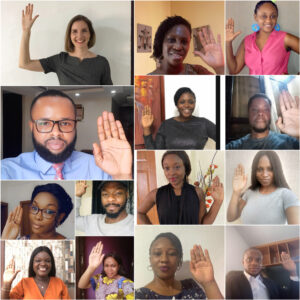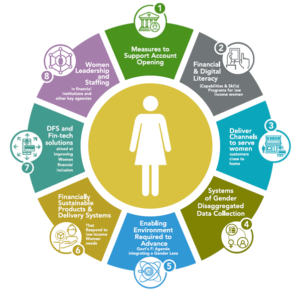Publication Categories
Media Room
Why we Choose to Challenge
March 8, 2021

Since EFInA began measuring financial access in 2008, we have seen steady, incremental progress in overall financial inclusion levels, with millions more Nigerian adults now using financial services.
However, when we look at gender and financial access, a different pattern emerges. More women than men are financially excluded, creating what we call a “gender gap” in financial access. Troublingly, this gender gap in financial access has not decreased since 2008. By comparison, the gender gap in many other countries in Sub-Saharan Africa has decreased. In fact, recent projections indicate that the financial inclusion gender gap in Nigeria will not decrease at all by 2030 if we continue business as usual.
Having seen this pattern, in 2019 EFInA partnered with the Central Bank of Nigeria’s Financial Inclusion Secretariat to conduct an in-depth Assessment of Women’s Financial Inclusion in Nigeria. This research found that, even when all other factors are held equal, women are less likely to use formal (regulated) financial services. In other words, if you meet a Nigerian woman and a Nigerian man who are very similar on paper (live in the same area, are the same age, have the same levels of education and income, both own mobile phones, both say that they trust banks, etc), the man will be more likely than the woman to use a formal financial service provider such as a bank.
While new providers and business models can open financial access more broadly (for example, rapid growth in mobile money has expanded financial access for both men and women in many neighbouring countries), those players also struggle to reach women effectively. For example, EFInA’s recent FinTech Landscape and Impact Assessment Study found that FinTech adoption in Nigeria is lower for women than for men, and only one out of the top 30 FinTechs has designed a product specifically for women. Across the board, the formal financial sector is not reaching women effectively, and we need to collectively work harder to fix this.
I like that the theme for International Women’s Day this year is Choose to Challenge. Driving women’s economic empowerment in Nigeria will require us to challenge our established ways of thinking and operating, whether at work, in our communities, or in our homes. We need to challenge statements such as “men are better managers” or “married women are more reliable employees.”
These are built around what we call gender norms, or informal rules and shared social expectations. We need to understand these norms when designing financial services for women (see the article in this newsletter about using personas, a useful tool for doing so). We also need to reflect on these norms and Choose to Challenge them when they do not make sense.
Even seemingly benign social norms can be restrictive for women and detrimental to society. For example, I recently walked into a kitchen and saw a woman re-washing dishes that a man had previously “washed,” but which were still covered with a thin coat of cooking oil. I asked why she needed to do this extra work, and she explained that she did not mind since “men are just not as good as women at washing plates.” This may seem minor, but when we accept the idea that women are inherently better at domestic work than men, we allow an invisible burden of domestic care to tip the scales of equal access to school and work. When girls spend more time doing household chores than their brothers, they have less time to study. A second shift of domestic care responsibilities for adult women can restrict their career options in subtle ways. This contributes to our research findings that women are more likely to be “time poor” and therefore taking an hour out of the day to walk to a nearby bank branch or agent and stand in a queue can be prohibitive. Since this is the reality that women face today, we need to design financial services with an understanding of these challenges. At the same time, we can Choose to Challenge the underlying dynamics that drive gender inequality more broadly.
Last year, EFInA supported the Financial Inclusion Special Interventions Working Group and the CBN’s Financial Inclusion Secretariat in launching a Framework for Advancing Women’s Financial Inclusion in Nigeria. This framework sets forth eight strategic imperatives that all stakeholders in the Nigerian financial sector can jointly undertake to close the gender gap in financial access. The following blog posts explore ideas related to implementation of select strategic imperatives set forth in the framework:
We also invite you to test your knowledge by taking this quiz on women’s financial inclusion.
We look forward to continuing the conversation about women’s financial inclusion and economic empowerment. Please reach out to us at info@efina.org.ng or via our social media handles with any questions, requests, comments, or insights. And stay tuned for more resources from EFInA, including the results from our newest Access to Financial Services in Nigeria Survey, which will be launched next month.
Eight Strategic Imperatives for Advancing Women’s Financial Inclusion
Source: Framework for Advancing Women’s Financial Inclusion in Nigeria



